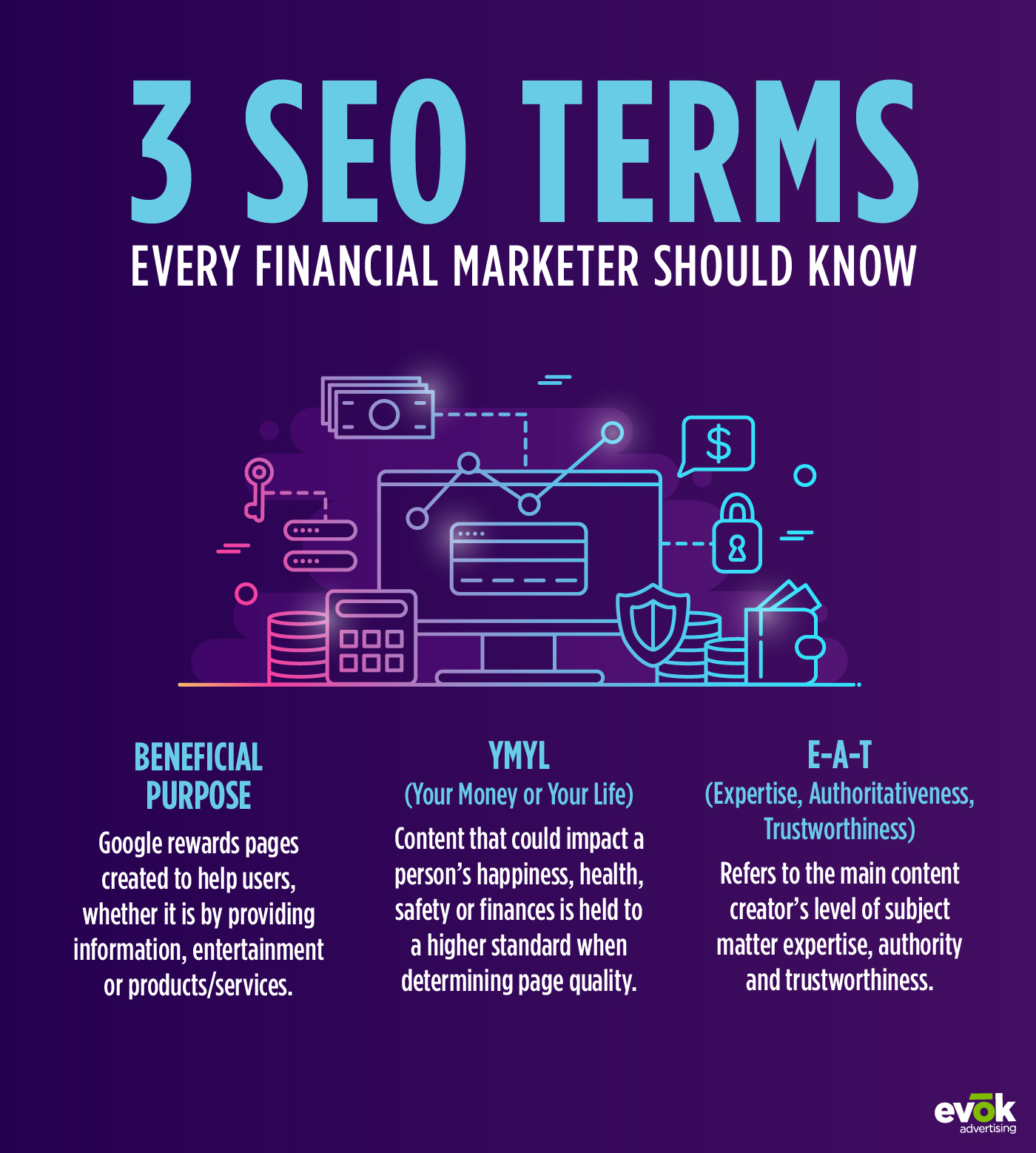
Improving Search Engine Performance for Financial Services and Credit Unions

It’s official—online searches have all but replaced a call to mom or dad whenever a financial question comes up. Parents, colleagues, or that one friend who majored in finance were once the usually-less-than-qualified authority when it came to financial advice. Today, financial consumers have increased access to (more accurate) information online. For financial marketers, that means two things: people are likely to be looking for financial information and advice using search engines, and your website must be built to deliver that content with quality in mind.
Understanding How Google Defines Quality Content for Financial Websites
In 2015, search engine marketers caught a glimpse at the inner workings of Google’s ranking process when the company released its Search Quality Evaluator Guidelines in their entirety. While these guidelines and the search engine’s algorithm have been amended and evolved over the years, three keys to measuring the quality of web content have remained constant—beneficial purpose, E-A-T, and Your Money or Your Life. These three components affect how Google ranks a page’s quality, with higher quality pages listing higher than those with a lower score. Here’s what you need to know about each one.
Beneficial Purpose
According to Google, “Websites and pages should be created to help users.” This “beneficial purpose” spans a variety of definitions, including sharing information, expressing an opinion, or serving as entertainment. For example, the purpose of a credit card landing page would be to inform potential applicants about offers and terms. Search engines might see a page without this information as trying to profit from visitors without any attempt to benefit them, which would warrant a low page quality score.
Also worth noting, industry, page type, or purpose do not affect a page’s quality rank. That means a page explicitly designed for humor or entertainment purposes would not automatically have lower page quality than a page meant to educate. If a page serves to benefit its viewers, it is considered effective.
Your Money or Your Life (YMYL)
Your Money or Your Life (YMYL) content is any content with the potential to affect a user’s happiness, health, safety, or financial stability. This type of SEO content is critical to financial marketers. The bulk of the content you produce and publish could impact readers, especially if it is incorrect, inaccurate, or confusing.
Google’s quality evaluators must determine whether or not content is considered YMYL, and the standards of quality on these pages are, understandably, very stringent. And when we talk about quality evaluators, we mean real people, all over the world, who conduct actual searches and rate the results that come up for each. That means search engine marketers publishing YMYL content must not only optimize that content for algorithms, but also ensure it’s up to the standards of Google’s human search quality raters. That’s where E-A-T comes into play.
E-A-T: Expertise, Authoritativeness, Trustworthiness

E-A-T refers to the Expertise, Authoritativeness, and Trustworthiness of the content’s author. In the case of websites for credit unions or other financial entities, E-A-T refers to your institution. YMYL content must showcase the highest levels of E-A-T to satisfy evaluators’ strict standards for this type of content. Here’s what goes into each of three quality factors:
Expertise
Content creators demonstrate subject matter expertise in several ways. For one, accreditations and credentials go a long way in proving you have the knowledge and training to offer financial information or advice. Consider including author bios for those contributing content to your site, especially if they are considered experts in their field.
However, diplomas and certificates aren’t the only factors search engines consider. “Everyday experts” are writers who may not have extensive education in a particular field, but their life experience has afforded them an in-depth understanding of the matter.
But above all, producing quality content regularly can help establish your website as an expert resource for visitors.
Authoritativeness
It’s important to note being an expert on a subject does not inherently make you an authority on the matter. Authoritativeness requires influence and widespread recognition, not just from those looking for information but also from other leaders in your industry.
How can you prove your authority in the financial field? Customer or member testimonials and product or service reviews show search engines and website visitors that your institution is a legitimate financial partner.
Trustworthiness
Finally, trustworthiness comes into play in determining your pages’ quality in Google’s eyes. Your content must be accurate and true, with sources cited wherever necessary. Trust is also built by sharing unbiased information to serve the purpose of educating readers, not simply selling to them.
Trust and safety also go hand in hand. A secure HTTPS site will help visitors feel at ease while an SSL certificate protects their information. Secure HTTPS is particularly important for credit union and banking websites whose products and services tie in directly with a person’s financial wellbeing.
Search Engines and the Financial Services Industry: An Ongoing Process
Beneficial purpose, YMYL, and E-A-T all play a role in determining your page’s quality according to search engines. That quality score dictates where your website ranks when users search for information on financial topics. Of course, the closer to the top of the first page of search engine results your content ranks; the more likely users will be to click on it and, ultimately, interact with your website.
But remember, this is not a linear process. Financial marketers must always be working to improve their search engine rankings by optimizing content to meet Google’s quality standards while providing consumers with the information they need to make savvy financial decisions.